Key takeaways:
- Interfaith friendships enhance personal growth by challenging perspectives and fostering empathy through shared experiences.
- Religious education is vital for promoting understanding and respect among diverse faiths, enabling critical thinking and open dialogue.
- Engagement with different beliefs encourages exploration of common values, leading to deeper insights into personal beliefs and practices.
- Active listening and sharing experiences with interfaith friends enrich one’s own spiritual journey and understanding of compassion.
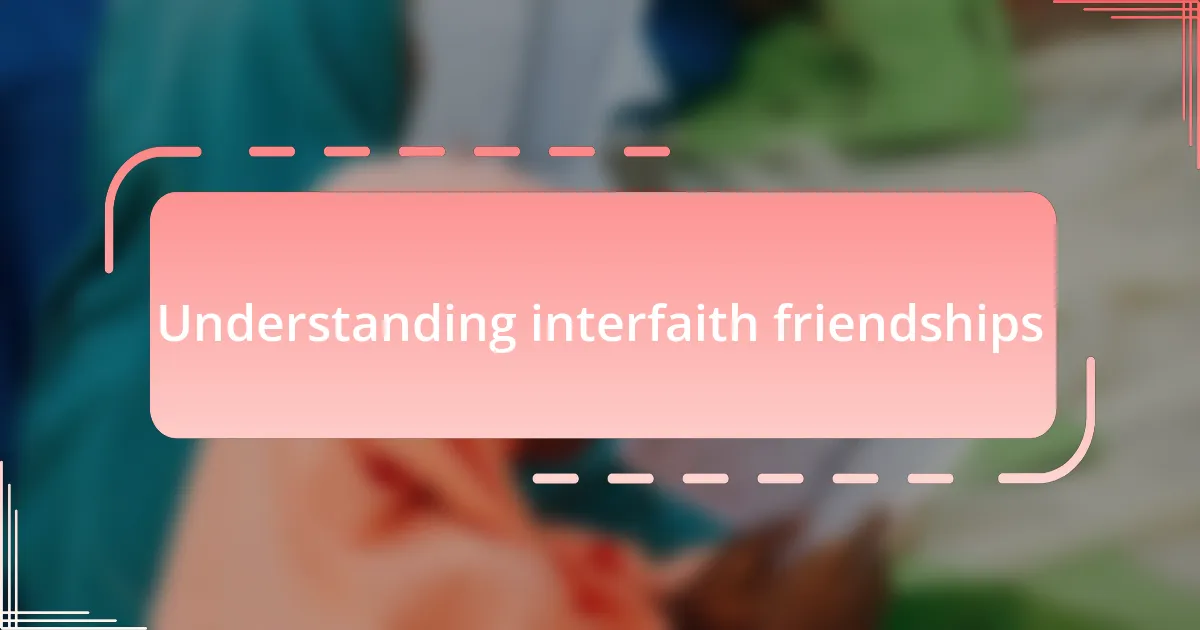
Understanding interfaith friendships
Interfaith friendships can be incredibly enriching, often challenging us to step outside our comfort zones. I remember a dear friend of mine who practices Buddhism, and our conversations opened my eyes to concepts of mindfulness that were new to me. Have you ever found that someone from a different faith can teach you something valuable about your own beliefs?
Sharing personal stories creates a bond that transcends religious differences. During a particularly difficult time, I turned to my interfaith friend, who offered a perspective grounded in compassion rather than judgment. Their empathy reminded me that our diverse backgrounds don’t divide us; they help us grow together.
Understanding interfaith friendships means embracing a shared humanity. Reflecting on times spent with friends from different faiths, I see how my worldview has expanded. Have you noticed how moments of laughter or shared struggles forge connections that extend beyond our belief systems? It’s these experiences that illustrate the beauty of interfaith relationships.
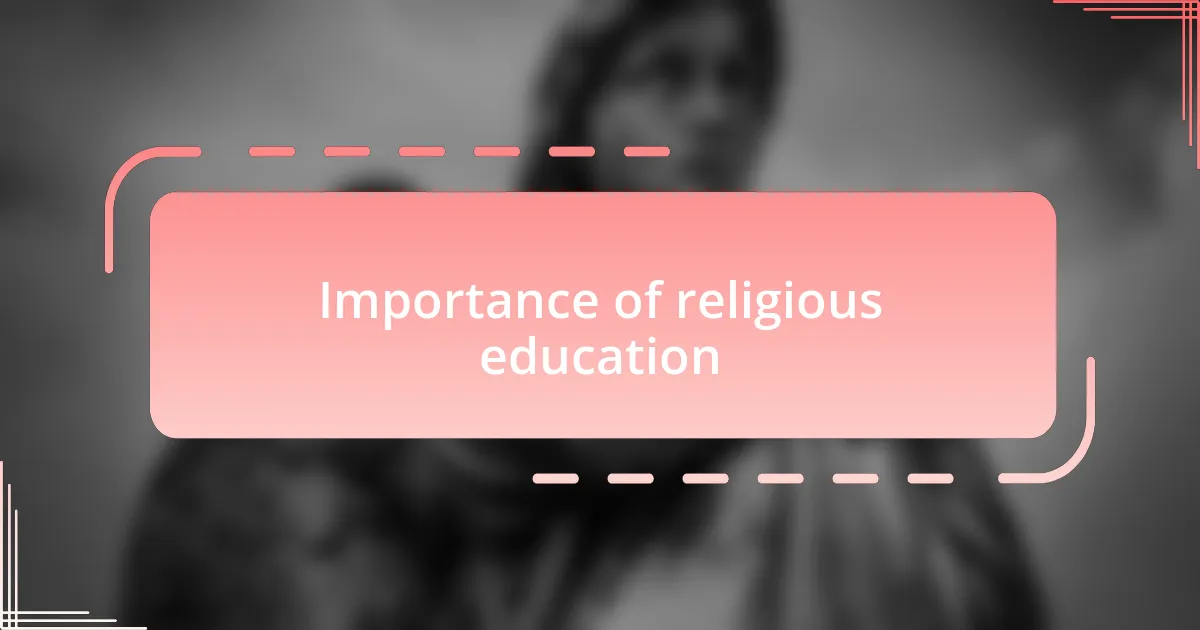
Importance of religious education
Religious education plays a crucial role in fostering understanding and respect among individuals from different faith backgrounds. I recall attending a seminar on world religions that not only deepened my knowledge but also challenged my assumptions. Have you ever felt your perspective shift after learning about the rituals and beliefs of another faith? It’s a powerful experience that highlights the value of education in bridging divides.
Incorporating religious education into our curricula benefits society as a whole. It equips young minds with critical thinking skills and empathy, essential qualities in our increasingly diverse world. For instance, when I facilitated discussions about sacred texts with students of varying beliefs, their ability to relate those teachings to contemporary issues was remarkable. Isn’t it inspiring how understanding different perspectives can shape our approach to conflict resolution?
Additionally, religious education encourages open dialogue, helping to dismantle stereotypes and preconceived notions. I remember a group project where we explored the significance of various holidays across faiths. The insights shared were eye-opening; hearing my peers’ genuine interpretations allowed me to appreciate diverse traditions in a way I never anticipated. How often do we miss these opportunities for connection when we stay within the confines of our own beliefs?
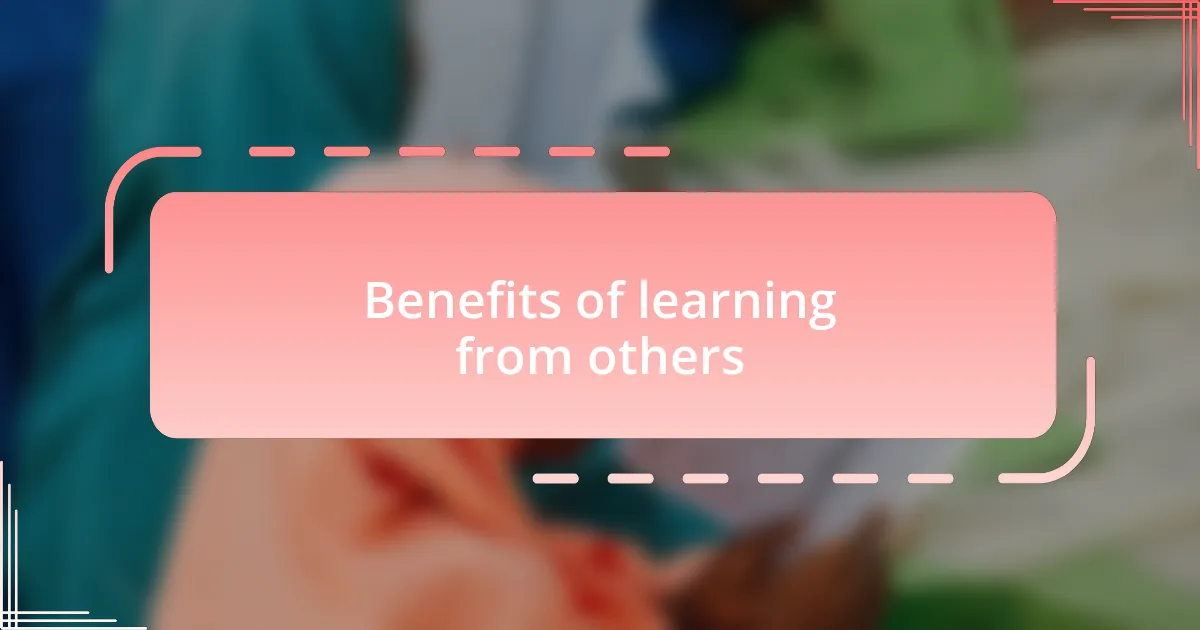
Benefits of learning from others
Learning from others offers a unique perspective on the world, often revealing layers of understanding that our own experiences may overlook. During a conversation with a friend from a different faith, I discovered insights into their customs that I had never encountered before. This revelation not only broadened my worldview but also made me realize how much we can grow by simply listening to one another.
The act of sharing experiences fosters empathy, which is crucial for building stronger communities. I remember participating in a panel where individuals shared their personal stories related to faith. It was eye-opening to hear how their beliefs shaped their life choices. Have you ever been surprised by how much common ground you can find in someone else’s journey? These moments remind us that, despite our differences, we share fundamental human experiences.
Moreover, learning from others can challenge and refine our own beliefs. I once attended an interfaith gathering where attendees debated various ethical dilemmas from their faith perspectives. It was unsettling at times, but ultimately enlightening as I found myself re-evaluating my stance on certain issues. Isn’t it fascinating how engaging with diverse viewpoints can lead us to profound personal growth?
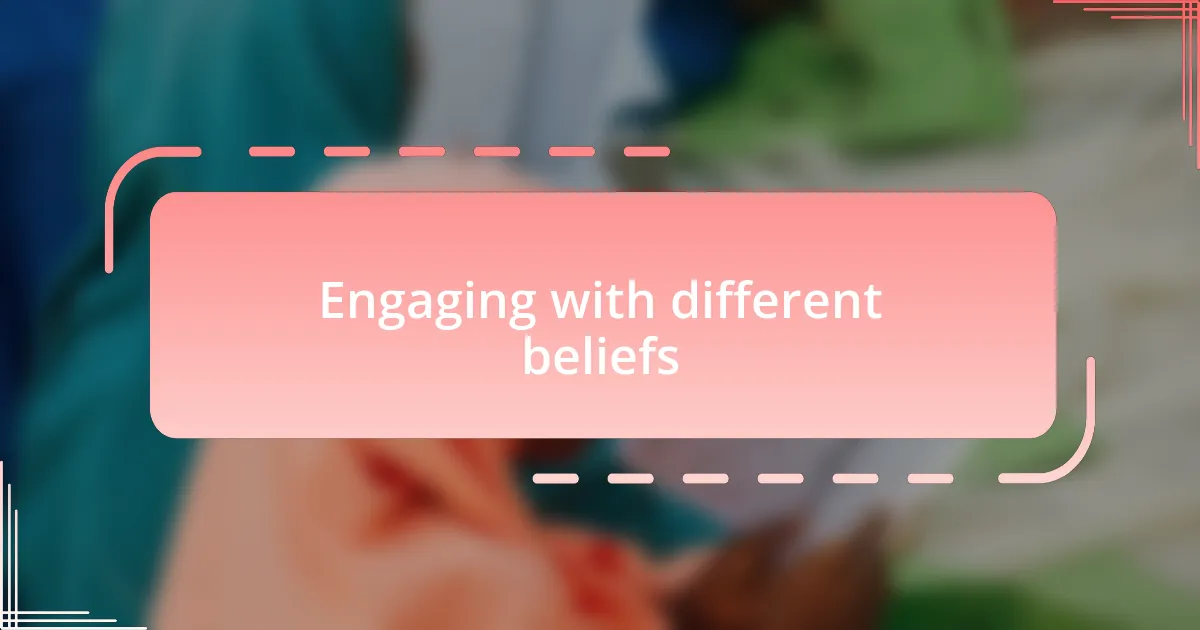
Engaging with different beliefs
Engaging with different beliefs opens up a rich tapestry of experiences that can deeply shape our understanding of the world. I remember a time when I attended a cultural festival where various faiths set up booths to share their traditions. As I tasted different foods and listened to stories, I felt a sense of connection that transcended religious differences. Have you ever noticed how shared experiences can break down barriers and foster friendships?
The beauty of engaging with diverse beliefs lies in the conversations that often follow. During a cozy coffee chat with a friend from a different faith tradition, we explored the meaning of gratitude in our lives. It was striking how our interpretations were unique yet reflected similar values. Doesn’t it make you consider how much we can learn just by sharing our perspectives?
I’ve found that grappling with unfamiliar beliefs can sometimes evoke discomfort, yet this discomfort can lead to growth. I once joined a book club where we read literature from various religious authors. At times, I felt challenged by their viewpoints, pushing me to confront my own biases. Isn’t it intriguing how stepping out of our comfort zones can enrich our understanding of ourselves and others?
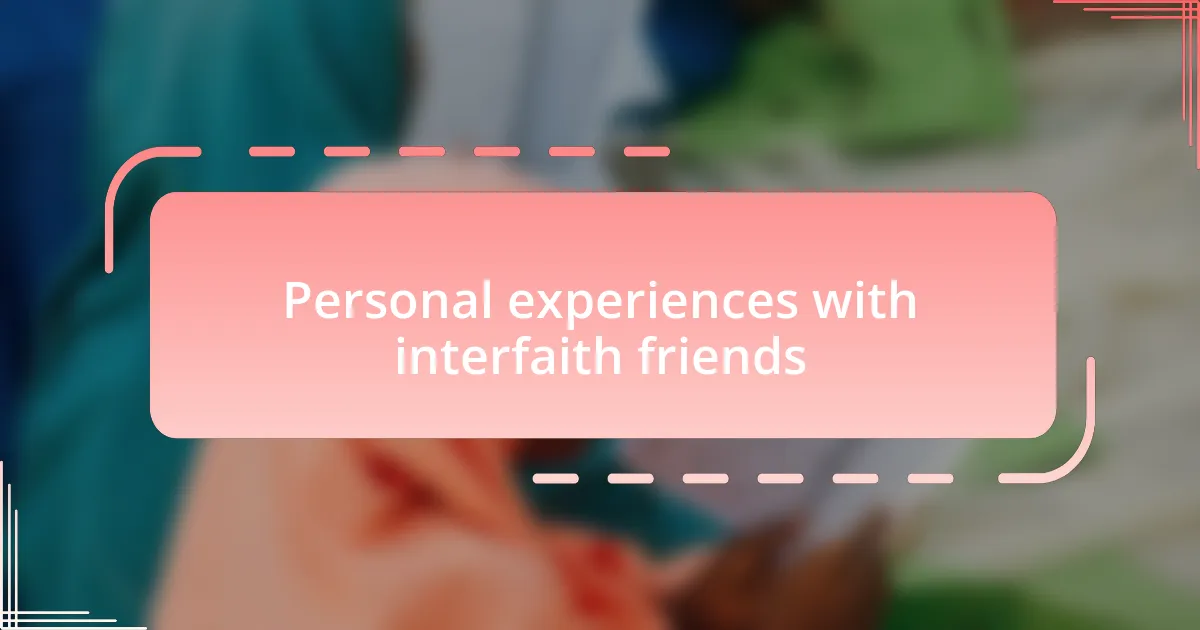
Personal experiences with interfaith friends
Engaging with interfaith friends has profoundly changed my perspective on belief systems. One evening, I found myself at a dinner hosted by a close friend from a different faith. As we shared our favorite dishes and swapped stories about our traditions, I felt an unexpected warmth and understanding. Have you ever felt that moment when differences melt away, and you realize how much more you have in common than you thought?
A heartfelt conversation with an interfaith friend left a lasting impression on me. We were discussing the concept of forgiveness, and I was surprised by their approach, which emphasized empathy rather than just letting go of grievances. This conversation challenged my own views and made me reflect on how forgiveness can be a bridge between varying beliefs. Doesn’t it strike you how one discussion can open up a whole new dimension of understanding?
I recall a moment of vulnerability during a group project with friends from diverse faith backgrounds. We shared our experiences surrounding loss and hope, and it was moving to see how our different beliefs shaped our coping mechanisms. The realization that grief doesn’t discriminate between faiths taught me a valuable lesson about human resilience. How often do we miss these shared experiences because we stay within our own circles?
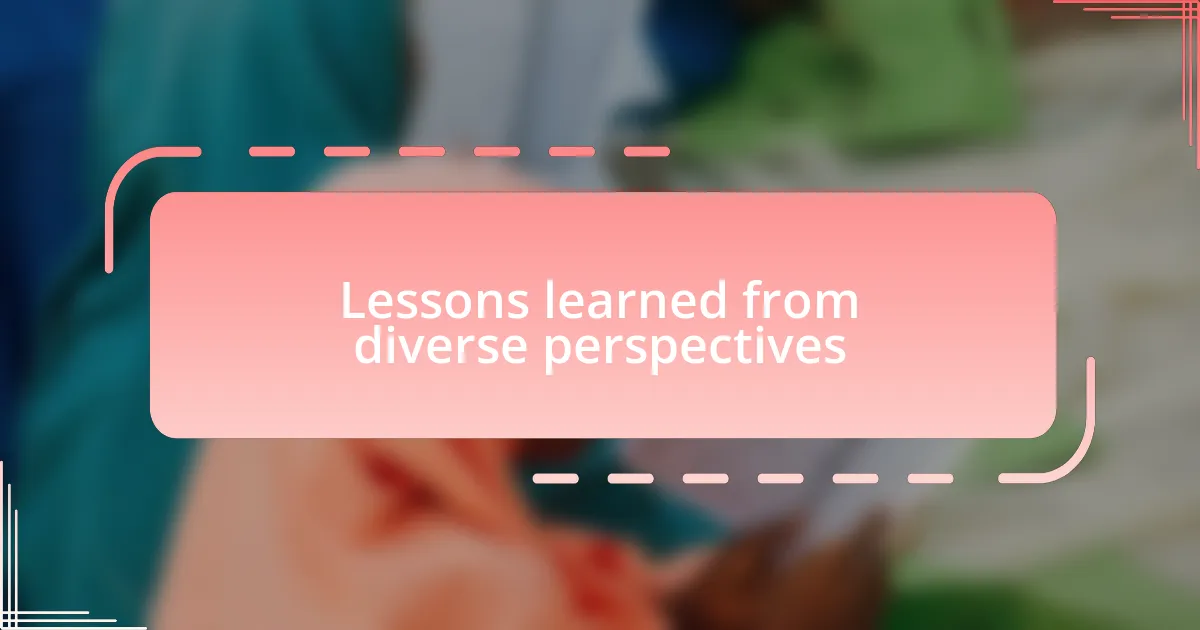
Lessons learned from diverse perspectives
Engaging with friends from various faiths has shown me that each belief system offers unique emotional insights. During a discussion about community service, I learned about a friend’s tradition of charity that deeply resonated with me. Hearing them describe how giving is a form of spiritual practice made me reconsider my own approach to altruism. Have you ever realized that acts of kindness could transcend belief, becoming a universal language of hope?
I distinctly remember a time when we spent an afternoon exploring our favorite rituals. Sharing the symbolism behind certain practices illuminated so many layers of meaning for me. I found it fascinating how a simple act, like lighting a candle, could have vastly different significance across traditions. This exploration made me appreciate the beauty in diversity—how these varied practices can embody similar core values. Isn’t it amazing how much wisdom exists in the unique threads of our dialogues?
Reflecting on moments spent with interfaith friends, I realized that the essence of understanding often lies in active listening. In one instance, while discussing the concept of love, I discovered just how multifaceted the term can be. Each interpretation my friends offered taught me that love is not just a shared emotion; it is deeply influenced by belief, culture, and personal life experiences. Have you ever considered how exploring these interpretations could lead to richer, more profound connections?
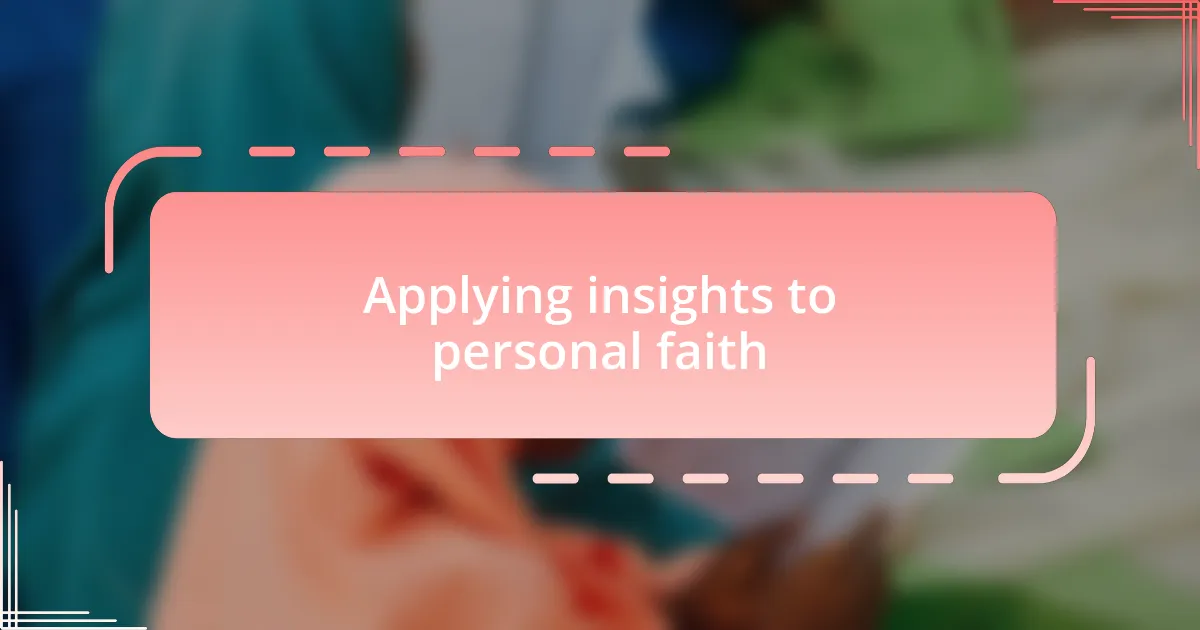
Applying insights to personal faith
Engaging with my interfaith friends has profoundly influenced my personal faith, prompting me to seek a more nuanced understanding of spiritual practice. For instance, during one memorable discussion about meditation, a friend from a Buddhist background shared the importance of mindfulness. This perspective challenged me to incorporate mindfulness into my own prayer routine, transforming my spiritual experience into something much deeper. Have you considered how a slight shift in practice can enhance your own spiritual journey?
I’ve also found that sharing highs and lows with friends from different faiths has provided me with a broader lens on my own beliefs. I remember a time when we gathered to support one of our friends through a difficult period. Observing how each faith community offered support in distinct yet meaningful ways made me realize that compassion knows no boundaries. It pressed me to reflect on how I could embody those values in my own life, enhancing my commitment to being there for others. Isn’t it interesting how the act of supporting one another can lead to an enriched understanding of our personal convictions?
These interactions have encouraged me to re-evaluate my beliefs and practices continually. One afternoon, a friend introduced me to the practice of gratitude journaling as a means of connecting with the divine. I initially viewed it skeptically, but after trying it out, I discovered how it shifted my perspective on daily experiences. It’s now a practice that brings me closer to my faith, prompting me to recognize the everyday moments of grace that I once overlooked. Have you ever found an unexpected practice that sparked a deeper connection to your beliefs?